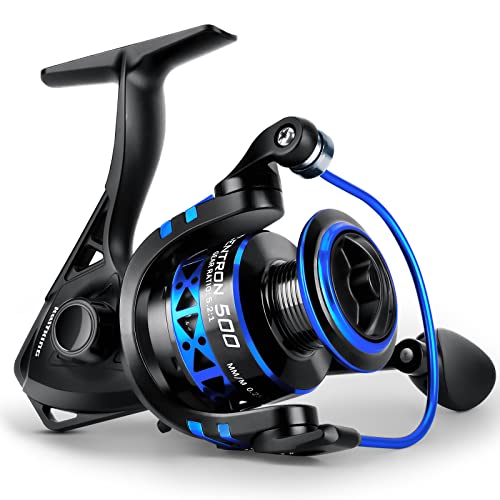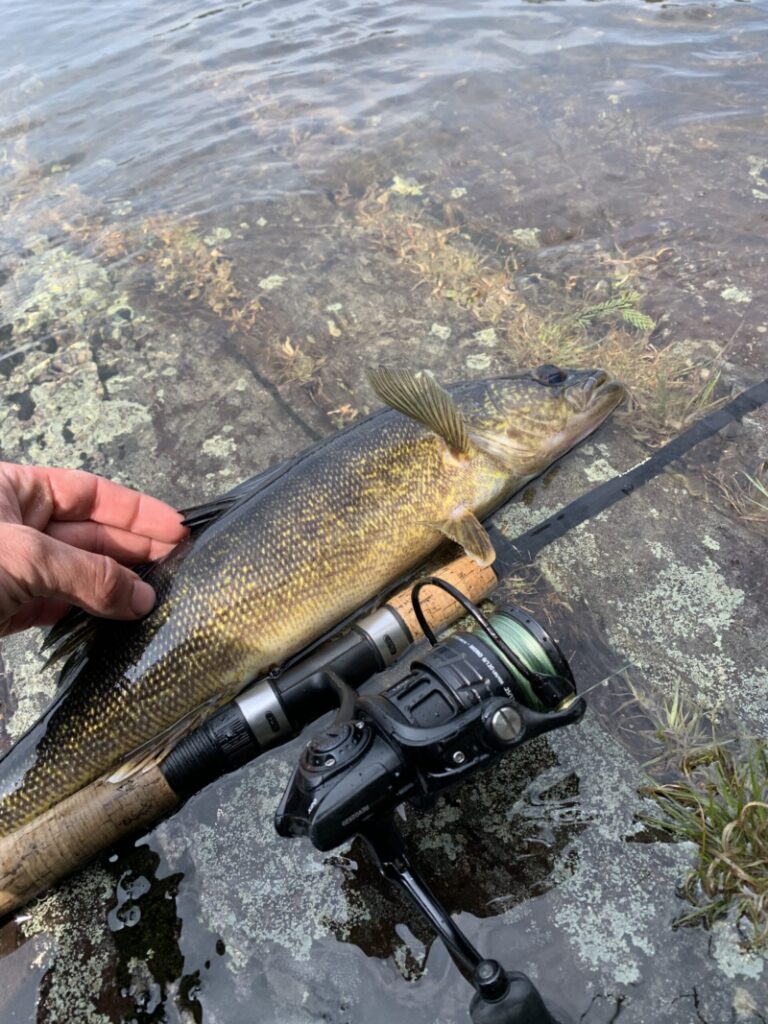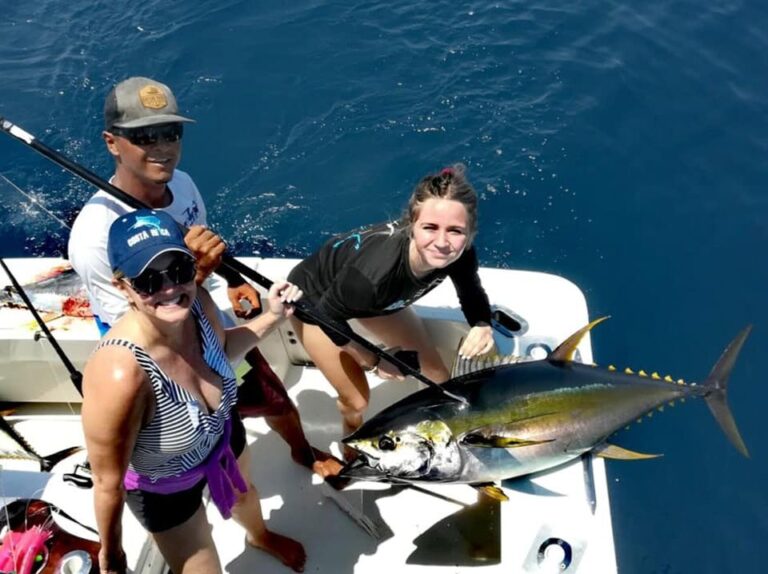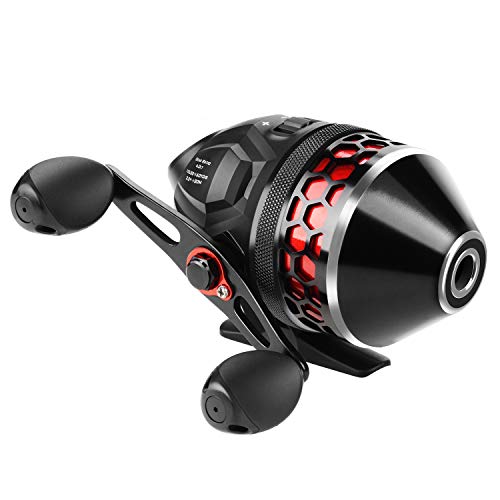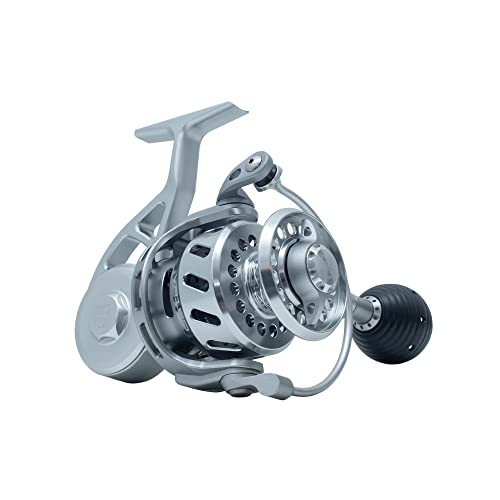Yes, overcast conditions can be good for fishing as it reduces visibility and can make fish more active and willing to bite. When the sky is overcast, sunlight is limited, reducing glare on the water surface and making it easier for fish to stay hidden and ambush their prey.
Additionally, overcast skies can also lower the water temperature slightly, which can stimulate fish activity. Fish often become more active in overcast conditions because they feel more secure and are less likely to be easily spotted by predators. Therefore, if you are planning a fishing trip, consider taking advantage of overcast conditions for increased chances of success.
Remember to pack your gear and enjoy the day on the water. Happy fishing!

Credit: www.oceancitytoday.com
How Overcast Affects Fish Behavior
The Relationship Between Light Levels And Fish Activity
Light plays a crucial role in influencing fish behavior and activity. The amount of light present in the water has a direct impact on their feeding patterns and overall behavior. Overcast skies, in particular, have a significant effect on light penetration in the water, which can have both positive and negative implications for fishing.
How Overcast Skies Reduce Light Penetration In The Water
When the skies are overcast, the clouds act as a natural filter, reducing the amount of sunlight that reaches the water’s surface. This results in lower light levels in the water column, limiting visibility for both fish and anglers. The reduction in light penetration can have several consequences for fish behavior and their ability to locate food sources.
Effects Of Reduced Light On Fish Behavior And Feeding Patterns
The diminished light levels caused by overcast skies can lead to changes in fish behavior and feeding patterns. Some of the notable effects include:
- Reduced feeding activity: Fish are less likely to actively feed in lower light conditions. The decreased visibility makes it more challenging for them to locate their prey and can result in reduced overall feeding activity.
- Increased cautiousness: Fish may become more cautious and hesitant to approach potential food sources in reduced light. The decrease in light levels can make them more wary of potential predators and increase their instinct for self-preservation.
- Changes in depth preference: With less light reaching the water, fish may change their preferred depth range. Deeper, darker waters provide them with more cover and protection, leading to a shift in their behavior and location.
- Altered aggression levels: Reduced light levels can also affect fish aggression levels. Some species may become less aggressive in their pursuit of food, while others may use the cover of darkness to their advantage, becoming more assertive in their feeding behavior.
- Different feeding strategies: Fish may adapt their feeding strategies when light levels are low. Some species may rely more on their lateral lines, which are sensitive to vibrations in the water, while others may rely on their sense of smell or rely on ambush tactics to catch prey.
Understanding how overcast skies impact fish behavior and feeding patterns is crucial for anglers. By considering these effects, fishermen can adjust their fishing techniques and strategies accordingly, increasing their chances of success even in challenging light conditions. So, next time you’re preparing for a fishing trip, take into account the impact of overcast skies and plan your approach accordingly.
Advantages Of Overcast For Anglers
Increased Fish Feeding Activity During Overcast Conditions
When it comes to fishing, weather plays a crucial role in determining the success of your fishing expedition. While many anglers prefer clear skies and bright sunshine, overcast conditions can actually provide some advantages in terms of fish feeding activity.
Here’s why:
- Overcast skies tend to lower the water temperature slightly, which can stimulate fish to feed more actively. Fish are cold-blooded creatures, which means their body temperature is influenced by their environment. Cooler water temperatures can trigger their feeding instincts, increasing the chances of a successful catch.
- Cloud cover diffuses sunlight, resulting in lower light intensity. This reduction in brightness can make fish feel more comfortable and less exposed, making them more willing to come out of hiding to feed. Fish that are typically shy during bright, sunny days may become more active and eager to bite when the skies are overcast.
- Overcast weather often brings with it a subtle change in atmospheric pressure. Some anglers believe that fluctuating pressure can influence fish behavior and feeding patterns. While studies on this theory are inconclusive, many experienced anglers swear by the increased fish activity during overcast conditions.
The Role Of Overcast Skies In Creating Optimal Fishing Conditions
Overcast skies have a significant role in creating the perfect fishing conditions for anglers. Let’s explore how these cloudy conditions can turn the odds in your favor:
- Overcast skies provide a natural form of camouflage. Just as predators use shadows to their advantage, overcast conditions create a similar effect for anglers. The reduced visibility can make it easier for you to approach fish without scaring them away. This stealthier approach can greatly increase your chances of a successful catch.
- Overcast weather often brings with it a gentle breeze. The movement of the wind can have multiple benefits for fishing. Firstly, it creates ripples on the water’s surface, which can break up any reflections and make your bait or lure appear more natural. Secondly, the breeze can oxygenate the water, attracting fish to the surface and increasing their activity levels.
- Overcast skies can also deter other anglers from venturing out. This means less competition and more opportunities to find undisturbed fishing spots. With fewer disturbances in the water, you can maximize your chances of attracting fish that haven’t been previously spooked by other anglers.
Overcast conditions can provide definite advantages for anglers. Increased fish feeding activity, the creation of optimal fishing conditions, and the ability to approach fish more stealthily are all benefits that overcast skies can bring. So next time the clouds roll in, don’t let it deter you from heading out on your fishing adventure.
Embrace the potential advantages that overcast weather can offer and reel in your next big catch!
Overcast Conditions: Ideal Fishing Opportunities
Identifying The Best Times To Fish Under Overcast Skies
When it comes to fishing, weather conditions play a significant role in determining the success of your fishing trip. Overcast skies, in particular, can create ideal fishing opportunities. Here are some key points to consider when identifying the best times to fish under overcast conditions:
- Overcast skies reduce the intensity of sunlight, creating a more comfortable environment for fish to venture out. They are less likely to be skittish and more prone to feeding during these conditions.
- The decrease in sunlight also affects the behavior of certain fish species. Many fish, such as bass and trout, tend to be more active and feed aggressively when the sun is obscured by clouds.
- Overcast skies can lower water temperatures slightly, which can be favorable for certain fish species that prefer cooler water. These conditions often attract fish to shallower areas as well.
- Pay attention to the prevailing weather patterns when planning your fishing trip. Days following a storm or on the approach of a front are known to have extended periods of overcast skies, making them excellent times to fish.
Preferred Fishing Techniques And Baits For Overcast Conditions
When fishing under overcast skies, it’s essential to adapt your techniques and bait choices to maximize your chances of success. Here are some preferred fishing techniques and baits for overcast conditions:
- Topwater lures: Fish tend to be more active near the water’s surface during overcast conditions, making topwater lures an excellent choice. Buzzbaits, poppers, and frogs are popular options to entice fish to strike.
- Crankbaits and jerkbaits: These lures mimic injured or fleeing baitfish and can be highly effective in overcast conditions. Choose colors that stand out against the darker, cloudy backdrop.
- Soft plastic baits: Worms, grubs, and creature baits rigged with texas or carolina rigs are versatile options in overcast conditions. Fish them slowly, allowing the bait to move naturally and attract predatory fish.
- Live bait: If permitted, using live bait such as worms, minnows, or shrimp can be highly effective. The reduced visibility created by overcast skies can make live bait even more appealing to fish.
Tips For Maximizing Fishing Success During Overcast Weather
To make the most of your fishing experience during overcast weather, consider these tips:
- Use polarized sunglasses: Even with reduced sunlight, polarized sunglasses can help you see beneath the water’s surface and spot fish more easily.
- Adjust your fishing style: Fish may be more cautious in overcast conditions, so it’s crucial to approach your fishing with more patience and finesse. Slow down your retrieval speed and vary your lure action to entice strikes.
- Focus on structure and cover: Fish are likely to seek shelter and ambush prey under overcast skies. Target areas with prominent structure, such as submerged rocks, fallen trees, or weed beds, as well as any visible cover.
- Be adaptable: If your initial approach isn’t yielding results, don’t hesitate to switch techniques or bait choices. Overcast conditions can make fish behave differently, so experimenting with different options can pay off.
- Consider the water depth: Overcast skies tend to make fish more comfortable in shallow areas. Shorelines, drop-offs, or areas with gradual depth changes may hold more fish during these conditions.
Remember, while overcast skies can provide excellent fishing opportunities, other factors such as water temperature, fish species, and local conditions should also be taken into account. Stay prepared, be observant, and enjoy the experience of fishing under these optimal conditions!
Expert Tips And Strategies For Overcast Fishing
Insights From Professional Anglers On Fishing Under Overcast Conditions
Experienced anglers understand that overcast weather can have a significant impact on fishing. When the sky is cloudy and the sun is hidden, fish behavior can change, making it important to adjust your fishing techniques accordingly. We’ve gathered insights from professional anglers to help you make the most of overcast conditions.
- Fish behavior: Overcast weather tends to make fish more active and likely to feed throughout the day. Cloud cover can create a sense of security for fish, leading to increased feeding opportunities.
- Fishing spots: Look for areas with structure and cover, such as docks, submerged vegetation, or underwater drop-offs. These spots provide shelter for fish and can be more productive during overcast conditions.
- Lure selection: Opt for lures that create vibrations and attract attention in low-light conditions. Spinnerbaits, buzzbaits, and crankbaits in darker colors can be effective choices. Soft plastic baits in natural colors also work well.
- Retrieve techniques: Vary your retrieve speed to find what the fish respond to. A slow and steady retrieve can be effective, as can a more aggressive and erratic retrieval. Experiment with different techniques until you find what works.
- Depth considerations: Fish may be closer to the water surface during overcast conditions. Start by targeting shallower areas and gradually work your way deeper if you’re not finding success.
- Watch for feeding activity: Keep an eye out for signs of fish activity, such as surface disturbances or baitfish jumping. These indicators can guide you to the areas where fish are actively feeding.
Techniques For Targeting Specific Fish Species During Overcast Weather
Different fish species have unique preferences and habits, even when it comes to overcast conditions. Here are some techniques to target specific species during cloudy days:
- Bass: Target bass by fishing along the edges of vegetation or other cover using soft plastic worms, jigs, or topwater lures. Slow presentations often work best.
- Trout: Trout tend to be more active during overcast weather. Look for areas with good water flow and present bait or lures that imitate their natural prey, such as small spinners, spoons, or nymphs.
- Walleye: When fishing for walleye under overcast skies, try using jigs tipped with live bait or a variety of crankbaits. Focus on deeper water and areas with structure such as drop-offs or submerged rocks.
- Panfish: Target panfish such as bluegill or crappie by fishing near vegetation or structure using small jigs or live bait such as worms or insects. Vary your presentation and adjust depths as needed.
Recommended Gear And Equipment For Overcast Fishing
Having the right gear and equipment can make a significant difference in your overcast fishing success. Consider the following recommendations:
- Polarized sunglasses: Good quality polarized sunglasses can help you see better in low-light conditions, allowing you to spot fish or underwater structures more easily.
- Lighter fishing line: Fish can be more cautious during overcast weather, so using lighter fishing line can increase your chances of a bite. Opt for a line with a lower visibility rating.
- Weatherproof clothing: It’s essential to be prepared for changing weather conditions. Invest in waterproof or water-resistant clothing that will keep you dry and comfortable.
- High-visibility lures: Choosing lures with bright or contrasting colors can help fish locate your bait more easily in overcast conditions. Experiment with different colors to find what works best.
- Portable fish finder: If you have access to a boat, a portable fish finder can be a valuable tool for locating fish and identifying underwater structure or depth changes.
- Rain gear: Be prepared for unexpected rain showers by carrying a lightweight, packable rain jacket or poncho. Staying dry can greatly enhance your fishing experience.
With these expert tips and strategies, you’ll be better equipped to take advantage of overcast fishing conditions. Remember to adapt your tactics to suit the behavior of the target species, and don’t forget the essentials like appropriate gear and equipment.
Happy fishing!
Overcast Fishing: Success Stories And Testimonials
Have you ever wondered if fishing during overcast weather could increase your chances of reeling in a big catch? Well, you’re not alone. Many anglers have experienced remarkable outings when fishing under cloudy skies. In this section, we will explore real-life accounts of anglers who have had successful catches during overcast days, as well as examples of specific overcast fishing trips with remarkable outcomes.
Additionally, we will hear from fishing enthusiasts who consider overcast conditions a game changer. Get ready to be inspired by their stories and testimonials!
Real-Life Accounts Of Anglers Experiencing Successful Catches During Overcast Days
- Angler a: On a gloomy morning, angler a decided to try his luck at a local lake known for its abundance of bass. While many fishermen opted to stay home due to the overcast conditions, angler a knew from his previous experiences that bass tend to be more active when the sky is covered with clouds. Within minutes of casting his line, he felt a strong tug on the other end. To his surprise, he reeled in a hefty largemouth bass, one of the biggest he had ever caught. This encounter reaffirmed his belief in the productivity of overcast fishing.
- Angler b: During a fishing trip to a river renowned for trout, angler b was delighted to find himself surrounded by dark clouds. As he made his first cast, he noticed several trout rising to the surface, eagerly searching for food. The overcast conditions provided concealment, making his lure appear more enticing to the hungry fish. With every cast, he felt the thrill of a bite, ultimately catching his limit of rainbow trout within just a few hours. Angler b now eagerly awaits overcast days to enhance his fishing adventures.
Examples Of Specific Overcast Fishing Trips With Remarkable Outcomes
- Example 1: Mike’s fishing charter: on a cloudy day in late spring, a group of anglers embarked on a fishing charter off the coast. Despite concerns about the lack of sunshine, the captain assured them that overcast weather often brings forth an abundance of fish near the surface. True to his words, the group managed to catch a variety of species, including snapper, grouper, and even a massive king mackerel. The overcast conditions worked in their favor, giving them a memorable fishing experience they would never forget.
- Example 2: Sarah’s trout adventure: sarah, an avid trout angler, planned a trip to a mountain stream renowned for its trophy-sized trout. On the day of her excursion, the sky was overcast, with occasional drizzles. This didn’t deter her spirits because she knew that trout are more active and less cautious during such conditions. To her delight, sarah caught several impressive trout, including a beautiful brown trout that measured over two feet long. The overcast sky proved to be a crucial factor in her successful trout adventure.
Testimonials From Fishing Enthusiasts Who Deem Overcast As A Game Changer
- John fisher: “i’ve been fishing for over 20 years, and i can confidently say that overcast conditions have significantly improved my catch rates. The diffused light makes fish less skittish, enabling me to present my bait or lure more naturally. Some of my best fishing memories involve reeling in trophy-sized fish during cloudy days. Overcast weather is unquestionably a game changer for any angler seeking success.”
- Emma angler: “as a passionate angler, i’ve come to appreciate the magic of fishing under overcast skies. The clouds create an ambiance that appeals to fish, enticing them to feed more actively. I’ve had amazing fishing trips during cloudy weather, catching magnificent specimens that put up a thrilling fight. Overcast fishing has transformed the way i approach my angling pursuits, igniting a new level of excitement and triumph.”
By now, you’ve heard real-life accounts of anglers who have experienced successful catches during overcast days, witnessed examples of specific overcast fishing trips with remarkable outcomes, and learned testimonials from fishing enthusiasts who consider overcast conditions a game changer. As you can see, fishing during cloudy weather can be highly rewarding, opening up opportunities for memorable catches.
So, next time you see an overcast sky, don’t hesitate to grab your fishing gear and head out for an adventure on the water!
Common Challenges Of Overcast Fishing
Potential Difficulties That Anglers May Face When Fishing Under Overcast Skies
Fishing on overcast days can present unique challenges for anglers. While these conditions may seem less favorable, there are techniques that can be employed to overcome the difficulties and still have a successful fishing trip. Here are some common challenges of overcast fishing and strategies to overcome them:
- Decreased visibility:
- Overcast skies can reduce visibility both above and below the water, making it harder to spot fish.
- To overcome this challenge, anglers can use brightly colored lures or bait that can be easily seen by fish in low-light conditions.
- Using artificial light sources such as headlamps or fishing lights can also help improve visibility while fishing.
- Changing fish behavior:
- Fish behavior can be influenced by the weather, including overcast conditions. Some fish species may become less active or change their feeding patterns.
- Anglers should be prepared to adjust their fishing techniques to match the altered behavior of the fish.
- Slowing down the retrieval speed of lures or using live bait can often entice fish to strike, even when they are less active.
- Adjusting strategies for different overcast conditions:
- Overcast conditions can vary in intensity, ranging from light cloud cover to heavy, dark skies.
- Different overcast conditions may require adjustments in fishing strategies. For instance:
- During lighter overcast conditions, fish may still be willing to venture near the surface. Anglers can focus on topwater lures or fishing with floating bait.
- In heavier overcast conditions, fish may seek deeper water or cover. Anglers should consider using sinking lures or fishing in areas with structure, such as submerged vegetation or rocky areas.
- Understanding the effect of light and shadows:
- Overcast skies can create a diffused light effect, reducing the presence of shadows in the water.
- Without the presence of distinct shadows, fish may be less likely to identify predators.
- Anglers can take advantage of this by using natural-colored lures that blend with the surroundings. This can make the lure appear more appealing to fish, increasing the chance of a strike.
Fishing under overcast skies comes with its own set of challenges. However, with the right techniques, anglers can overcome these difficulties and enjoy a successful fishing trip. By adapting to the decreased visibility, changing fish behavior, adjusting strategies for different conditions, and understanding the effect of light and shadows, anglers can improve their chances of hooking that elusive catch, even on overcast days.
Conclusion
Overall, overcast weather can have a significant impact on fishing success. The diffused light and cooler temperatures can increase fish activity, making it a great time to hit the water. Whether you’re a beginner or an experienced angler, overcast conditions provide unique advantages for all.
The decreased visibility can help you get closer to your target and make your bait less noticeable, increasing your chances of a bite. Additionally, the higher oxygen levels in cloudy conditions can attract more fish to shallower areas. However, it’s important to remember that overcast conditions alone are not a guarantee of a successful fishing trip.
Factors like water temperature, wind, and the type of fish you’re targeting also play crucial roles. Therefore, it’s essential to be prepared and adjust your strategies accordingly. So, next time you see an overcast sky, don’t hesitate to head out on the water and enjoy the bountiful fishing opportunities it can bring.

